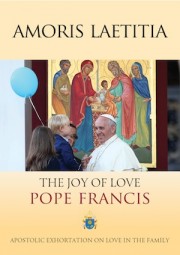BY Ian Dunn | April 8 | ![]() 0 COMMENTS
0 COMMENTS ![]() print
print

Pastoral care at heart of Pope’s vision for the family
Pope’s Francis long awaited document on the family calls on greater pastoral care for Catholics in unconventional situations but does not offer any doctrinal changes on issues like Communion for the remarried.
His post-synodal exhortation Amoris Laetitia (The Joy of Love) was released today and contains no new rules or norms. However, it encourages much greater attention to the language and attitude used when explaining Church teaching and ministering to those who do not fully live that teaching.
“No family drops down from heaven perfectly formed; families need constantly to grow and mature in the ability to love,” Pope Francis writes, adding that people grow in holiness, and the Church must be there to give them a helping hand rather than turn them away because they have not attained some degree of perfection.
The exhortation is the Pope’s reflection on the discussion, debate and suggestions raised during the 2014 and 2015 meetings of the Synod of Bishops on the family. Like synod members did, the Pope insisted that God’s plan for the family is that it be built on the lifelong union of one man and one woman open to having children.
The Holy Father’s document touches on all the issues raised at the synods and gives practical advice on raising children, urges a revision of sex-education programmes and decries the many ways the ‘disposable culture’ has infiltrated family life and sexuality to the point that many people feel free to use and then walk away from others.
“Everyone uses and throws away, takes and breaks, exploits and squeezes to the last drop. Then, goodbye,” he writes.
Much of the document is tied to the theme of God’s mercy, including the Pope discussion of welcoming the vulnerable.
“Dedication and concern shown to migrants and to persons with special needs alike is a sign of the Spirit,” he writes. Both are ‘a test of our commitment to show mercy in welcoming others and to help the vulnerable to be fully a part of our communities.’
The synod issues that garnered the most headlines revolved around the question of Communion for the divorced and civilly remarried, as well as Catholic attitudes toward homosexuality.
“In no way must the church desist from proposing the full ideal of marriage, God’s plan in all its grandeur,” Pope Francis said at that time.
in the new documents repeats his and the synod’s insistence that the Church cannot consider same-sex unions to be a marriage, but also insisted, ‘every person, regardless of sexual orientation, ought to be respected in his or her dignity.’
On the question of families experiencing difficulties, separation or even divorce and remarriage, Pope Francis writes responses to the questionnaires sent around the world before the synod ‘showed that most people in difficult or critical situations do not seek pastoral assistance, since they do not find it sympathetic, realistic or concerned for individual cases.’
The responses, he writes, call on the Church ‘to try to approach marriage crises with greater sensitivity to their burden of hurt and anxiety.’
Particularly in ministry to divorced and civilly remarried Catholics, the Pope says, pastors must help each couple look at their actions and circumstances, recognise their share of responsibility for the breakup of their marriage, acknowledge Church teaching that marriage is indissoluble and prayerfully discern what God is calling them to.
The Pope believes it would be a ‘grave danger’ to give people the impression that ‘any priest can quickly grant ‘exceptions’ or that some people can obtain sacramental privileges in exchange for favours.’
At the same time, he insisted, ‘the way of the Church is not to condemn anyone forever; it is to pour out the balm of God’s mercy on all those who ask for it with a sincere heart’. Divorced and civilly remarried couples, especially those with children, must be welcomed in Catholic parishes and supported in efforts to raise their children in the faith.
Generally, without an annulment of their sacramental marriage, such a couple would not be able to receive Communion or absolution of their sins unless they promised to live as ‘brother and sister.’ But every situation is different, the Pope writes, which is why the Church does not need new rules, but a new commitment on the part of pastors to provide spiritual guidance and assistance with discernment.
The Holy Father uses the document’s footnotes to specify that the consequences include whether or not the couple might eventually be able to receive Communion: “This is also the case with regard to sacramental discipline, since discernment can recognise that in a particular situation no grave fault exists,” he writes. Those who are in a state of serious sin are not to receive Communion.
Another footnote comments on the Church’s request that remarried couples who had not received an annulment and who want to receive the Sacraments forego sexual relations. “In such situations, many people, knowing and accepting the possibility of living ‘as brothers and sisters’ which the Church offers them, point out that if certain expressions of intimacy are lacking, ‘it often happens that faithfulness is endangered and the good of the children suffers,” he writes.
The Pontiff writes that he understood those ‘who prefer a more rigorous pastoral care which leaves no room for confusion.’
“But I sincerely believe that Jesus wants a Church attentive to the goodness which the Holy Spirit sows in the midst of human weakness, a mother who, while clearly expressing her objective teaching, always does what good she can, even if in the process, her shoes get soiled by the mud of the street,” he adds.
Turning to those who believe allowing divorced and remarried Catholics to receive Communion waters down Church teaching on the indissolubility of marriage, the Pope writes, ‘we put so many conditions on mercy that we empty it of its concrete meaning and real significance. That is the worst way of watering down the Gospel’.
In many respects, Pope Francis writes, Church members themselves have presented and promoted such a dreary picture of married life that many people want nothing to do with it even though they dream of a love that will last a lifetime and be faithful.
“We have long thought that simply by stressing doctrinal, bioethical and moral issues, without encouraging openness to grace, we were providing sufficient support to families, strengthening the marriage bond and giving meaning to marital life,” he says. “We find it difficult to present marriage more as a dynamic path to personal development and fulfillment than as a lifelong burden.”
Pope Francis called for Church leaders to ensure more married couples are involved as leaders in designing and carrying out pastoral programmes for families. Their witness is key, he said.
“Marital love is not defended primarily by presenting indissolubility as a duty, or by repeating doctrine, but by helping it to grow ever stronger under the impulse of grace,” he says. “A love that fails to grow is at risk. Growth can only occur if we respond to God’s grace through constant acts of love, acts of kindness that become ever more frequent, intense, generous, tender and cheerful.”











